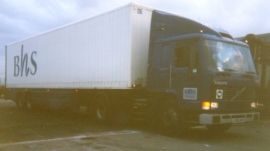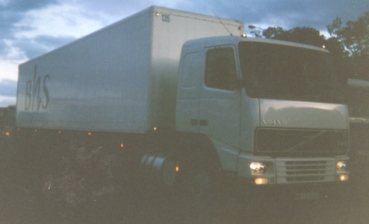
(This was a letter I sent to Transport News after the editor mentioned the problems limiters cause in a test of a new vehicle.)
Dear Sir,
In your recent test report on the MAN 18.463, you referred to the "downside" of speed limiter legislation, where yourself and a number of other lorries formed a "two lane procession", and you said you would hate to think what the M6 will look like after 1st January.
I travel on the M6 each night between junctions 12 and 34, mostly in vehicles limited to 56mph, and the effect is pretty bad already. Serious and unnecessary congestion is formed which, apart from the inconvenience and delay, causes danger. Once the traffic thins out and relieves the congestion, the main danger caused by limiters, namely fatigue, presents itself. If you examine a tachograph chart from a vehicle running on a limiter, you will see how accurately and unvaryingly it holds the set speed. This causes stress, fatigue, and loss of concentration in the driver. All that stands between a vehicle and an accident is the alertness of the driver. Speed limiters dull that alertness to a dangerous degree.
This point was vividly brought home to me a couple of weeks ago when I spent a night driving a vehicle whose limiter was, for some reason, set to about 64mph. The difference between that and my usual 56mph trucks was amazing. At the end of the shift, instead of being completely shattered, I was wide awake and alert, and felt I could have done the journey again! I had not, however, been riding the limiter at 64mph. A check on my tachograph afterwards showed that I had hardly touched the set speed. I had cruised at about 60mph all night. The difference was that the vehicle was under my control all the time. I had been driving the vehicle for a change, instead of being the passenger behind the wheel.
I maintain that if the set speed on limiters was increased to 65-68mph they would be of benefit to road safety. At or below the motorway speed limit, as they are now, they are a major source of danger.
Incidentally, I have noticed on my travels up and down the M6 that most of the lorries which pass me, having obviously disconnected or reset their limiters, are Scottish. This suggests that there is considerable opposition to limiters amongst Scottish operators. Their vehicles are not being driven at dangerously high speeds, but are running perfectly safely at around the speed limit, with the driver in full control of his vehicle. I consider these drivers to be less of a danger than I am, doing my limited 56. They are, however, laying themselves open to prosecution for tampering with their limiters. We should not have to break the law in order to be in control of our vehicles.
I seem to recall another article in "Transport News" some time ago, in which a haulier said that since the imposition of 56mph limiters, "overall journey times did not seem to have increased". Travelling time must have increased. Speed = distance/time. If speed is decreased then, for the same distance, time must increase. If the overall journey time is the same, the driver is making it up in other ways, most likely by taking shorter breaks. He may still be taking the statutory minimum, but he's probably had to forgo the odd 15 minutes tea break which does so much to keep him refreshed. So he's now grinding along at his fatiguing 56mph, and is taking less breaks to keep himself alert. An accident waiting to happen?
Forty thousand pounds worth of truck, perhaps two hundred thousand pounds worth of load, the reputation of the haulier, and, of course, the lives of everyone around him, depend on a lorry driver's alertness. Do we really want him driving on a limiter?
Your article on Transport Statistics prompted me to visit my local library to investigate these for myself. In 1992, the latest year for which I could find figures, we were not only "amongst the lowest in developed countries" for accidents per 100,000 of population, but of the 20 countries listed, nobody beat us! (Although Holland and Norway matched us). We killed 8, the Germans killed 12, and the French killed 17. (Portugal killed an amazing 34). Why are we allowing countries with a far worse accident record than us to dictate our road safety policies?
Statistics suggest that a British lorry on a Motorway is the safest vehicle in Europe, perhaps even the world. Given the traffic density in this country, and the antics of some of the motorists we share the road with, this can only be due to the skill and vigilance of the drivers. Speed limiters cause that vigilance to be eroded. This can only be a bad thing.
We need to pressure the Government to review this dangerous legislation, and, if they won't rid us of limiters altogether, to increase the set speed to at least 65. If they don't, then more people will be killed on motorways by fatigued and inattentive lorry drivers.
Other magazines are adopting an attitude of "well, you're stuck with them, so you might as well get used to them". I suspect that this may be because they derive considerable advertising revenue from speed limiter manufacturers. "Transport News" does not seem to be dependent on such advertising, and could take a leading role in publicising the dangers of limiters. For the safety of your readers and others, I hope you may consider taking on that role.
Published in "TRANSPORT NEWS", JAN 96.
© Copyright 1996
